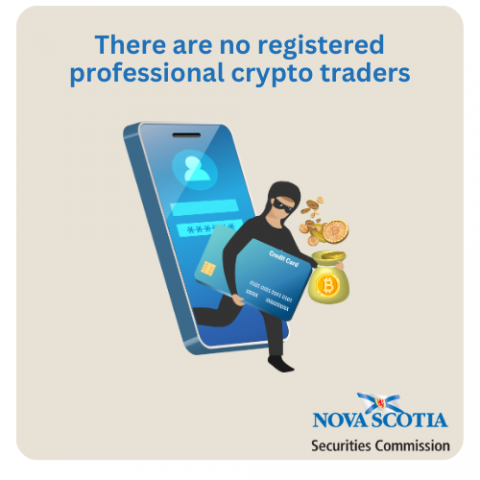Submitted by nsscadmin on

Throughout Fraud Prevention Month our Before You Invest Blog and social media channels have been sharing information on some prominent investment frauds that have been causing investors to suffer considerable losses. Today we’re focusing on a scheme where scammers claim to be a registered, professional crypto trader.
Investing in crypto assets continues to draw considerable interest by investors. The interest in crypto assets from the media, both traditional and more modern, is also high. However, just because people hear and read about crypto asset investing in the media and online does not mean they understand how it works or understand how to trade these assets.
There is a large segment of people that are interested in investing in crypto assets but don’t know anything about blockchain, hot and cold wallets, or private and public keys. Fraudsters know this and unfortunately are taking advantage of this lack of knowledge by posing as registered, professional crypto traders. It’s an elaborate scam that leads to unrecoverable losses of crypto assets.
Here’s how the scam works.
Mark has been investing for several years. He works with an advisor and does some DIY investing as well. He is interested in adding crypto asset investing to his portfolio but the adviser he works with does not offer that type of investing nor does the DIY platform he has been using. After researching crypto asset investing, including the basics of blockchain, private keys, and hot and cold wallets Mark is more confused than ever. He’s afraid if he manages his own crypto asset investing he will make some mistake and lose all of his money. What Mark wants is someone to invest in crypto assets for him.
Mark begins searching online for crypto asset investing help and finds an ad on social media. The ad promotes crypto asset trading advice and services from a registered, professional crypto trader. Mark clicks on the ad and is sent to a form page to fill out where he enters his contact information.
Not long after, Mark receives a phone call from a man named Jonathan. He tells Mark that he has been successfully trading crypto assets for several years and has made considerable profits. He also tells Mark he has recently become registered as a professional crypto trader allowing him to offer crypto asset trading advice and service to people like Mark.
Mark is excited because what Jonathan is offering him is exactly what he has been looking for. Jonathan offers to trade and manage crypto assets on Mark’s behalf. To get started he instructs Mark to create an account on a well-known crypto asset trading platform. Jonathan guides Mark through the steps of creating an account and making his first deposit. Once his funds have been deposited Jonathan walks Mark through the process of purchasing crypto assets, which include Bitcoin and Ethereum.
In some instances, the scam differs. Instead of instructing their victim how to create an account and how to purchase crypto assets the scammer will get their victim to download software that allows them to access and control their computer to do all the work for them. This is dangerous as it surrenders access to all files and information stored on the victim’s computer.
After Mark’s crypto purchase transaction has been completed, Jonathan tells him to transfer all his newly purchased crypto to him so he can trade it for him and make him huge profits. He provides Mark with instructions and a wallet address to transfer the assets. After the transfer is complete Jonathan hangs up on Mark. All of Mark’s attempts to contact Jonathan fail as do all further attempts to retrieve his crypto assets he transferred to Jonathan’s account.
Mark did not know that once crypto assets are transferred from one wallet to another, they are impossible to retrieve. Mark also did not know that there is no such thing as a registered professional crypto trader, as securities regulators do not provide that type of registration and oversight.
Here are things to remember to protect yourself from this type of scam:
Anyone who says are a registered crypto trader is lying and likely looking to take advantage of you. No regulators currently provide registration for anyone as a professional crypto trader.
Never download software you don’t know the source of or give anyone you don’t know remote access to your computer. This can give them access to personal information that could be used for identity theft, financial theft, or other types of fraud.
Never transfer your crypto assets off an exchange or from your wallet to the wallet of someone else you do not know. Once crypto assets have been transferred into a wallet you do not have the password or keys for, it is unrecoverable.
Educate yourself on how crypto asset trading works. If you don’t fully understand how an investment works, it may not be for you. Remember, stolen crypto assets are unrecoverable. Never invest more than you can afford to lose.
The Nova Scotia Securities Commission does not provide investment advice. We are not advising anyone to invest in or purchase crypto assets. This blog post provides information for educational purposes to help investors make more informed decisions.
